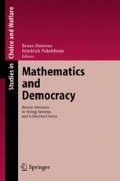Abstract
Simulation may be a useful tool to address some basic problems concerning the choice of the electoral system. A case study is analyzed as an example. The utility of including power indices is discussed. A simulation program is illustrated.
Access this chapter
Tax calculation will be finalised at checkout
Purchases are for personal use only
Preview
Unable to display preview. Download preview PDF.
References
Banzhaf, J.F. (1965). “Weighted Voting doesn’t Work: A Mathematical Analysis,” Rutgers Law Review, 19, 317–343.
Bissey, M.E., M. Carini and G. Ortona (2004). “ALEX3: A Simulation Program to Compare Electoral Systems,” Journal of Artificial Societies and Social Simulation 7 (electronic journal at http://jasss.soc.surrey.ac.uk).
Bowler, S., D.M. Farrell and R.T. Pettitt (2005). “Expert Opinion on Electoral Systems: So Which Electoral System is ‘best’?,” Journal of Elections, Public Opinion and Parties, 15, 3–19.
Christensen, N.B. (2003). Evaluating Voting Procedures Using Different Criteria and Computer Simulations, Conference of the European Public Choice Society, Aarhus.
Coleman, J.S. (1971). “Control of Collectivities and the Power of a Collectivity to Act,” in B. Lieberman (Ed.), Social Choice, London: Gordon and Breach, 269–300.
Deegan, J., and E.W. Packel (1978). “A New Index of Power for Simple n-person Games,” International Journal of Game Theory, 7, 113–123.
Farrell, D.M. (2001). Electoral Systems-A Comparative Introduction, Basingstoke: Palgrave.
Fragnelli, V., G. Monella and G. Ortona (2005). “A Simulative Approach for Evaluating Electoral Systems,” Homo Oeconomicus, 22, 524–549.
Gallagher, M. (1991). “Proportionality, Disproportionality and Electoral Systems,” Electoral Studies, 10, 33–51.
Gambarelli, G., and R. Biella (1992). “Sistemi elettorali,” Il Politico, 164, 557–588.
Gately, D. (1974). “Sharing the Gains from Regional Cooperation: A Game Theoretic Application to Planning Investment in Electric Power,” International Economic Review, 15, 195–208
Gini, C. (1914). “Sulla misura della concentrazione e della variabilita’ dei caratteri” Atti del Regio Istituto Veneto di Scienze, Lettere ed Arti, 73, 1203–1248.
Holler, M.J. (1982). “Forming Coalitions and Measuring Voting Power,” Political Studies, 30, 262–271.
Holler, M.J., and E.W. Packel (1983). “Power, Luck and the Right Index,” Zeitschrift für Nationalökonomie (Journal of Economics), 43, 21–29.
Lijphart A. (1999). Patterns of Democracy. Government Forms and Performance in Thirty-Six Countries, Yale: Yale University Press.
Merrill, S. III (1984). “A comparison of Efficiency of Multicandidate Electoral Systems,” American Journal of Political Science, 28, 49–74.
Merrill, S. III (1985). “A Statistical Model for Condorcet Efficiency based on Simulation under Spatial Model Assumptions,” Public Choice, 47, 389–403.
Mueller, D.C. (1989). Public Choice III, Cambridge: Cambridge University Press.
Ortona, G. (1998). “Come funzionano i sistemi elettorali: un confronto sperimentale,” Stato e Mercato, 54: 469–486.
Ortona, G. (2002). “Choosing the electoral system: why not simply the best one?,” Department POLIS, Universita’ del Piemonte Orientale, Working Paper 32.
Ortona, G. (2004). “Un nuovo sistema elettorale a due stadi e una sua valutazione mediante simulazione,” Polena, 2, 49–66.
Ortona, G. (2006). “Voting on the Electoral System: an Experiment,” Polena, forthcoming.
Owen, G. (1977). “Values of Games with a Priori Unions,” Lecture Notes in Economic and Mathematical Systems, 141, 76–88.
Shapley, L. S. (1953). “A Value for n-Person Games,” in Contributions to the Theory of Games, Vol II (Annals of Mathematics Studies 28) (Kuhn HW, Tucker AW eds.), Princeton: Princeton University Press, 307–317.
Shapley, L.S., and M. Shubik (1954). “A Method for Evaluating the Distribution of Power in a Committee System,” American Political Science Review 48, 787–792.
Trinchero, R. (1998). “Sistemi di voto e preferenze individuali: un’analisi comparata con l’uso della simulazione al calcolatore,” Working Paper 9802, Department of Economics, Universita’ di Torino.
Author information
Authors and Affiliations
Editor information
Editors and Affiliations
Rights and permissions
Copyright information
© 2006 Springer Berlin · Heidelberg
About this paper
Cite this paper
Fragnelli, V., Ortona, G. (2006). Comparison of Electoral Systems: Simulative and Game Theoretic Approaches. In: Simeone, B., Pukelsheim, F. (eds) Mathematics and Democracy. Studies in Choice and Welfare. Springer, Berlin, Heidelberg. https://doi.org/10.1007/3-540-35605-3_5
Download citation
DOI: https://doi.org/10.1007/3-540-35605-3_5
Publisher Name: Springer, Berlin, Heidelberg
Print ISBN: 978-3-540-35603-5
Online ISBN: 978-3-540-35605-9
eBook Packages: Business and EconomicsEconomics and Finance (R0)

